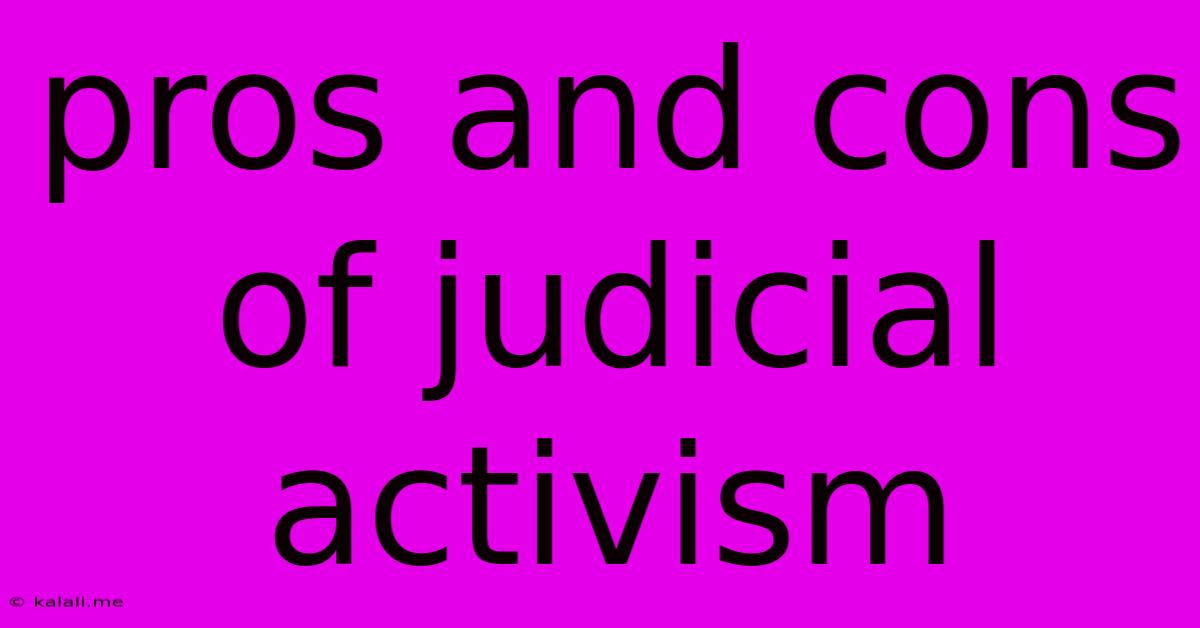Pros And Cons Of Judicial Activism
Kalali
Jun 12, 2025 · 3 min read

Table of Contents
The Double-Edged Sword: Exploring the Pros and Cons of Judicial Activism
Judicial activism, the willingness of judges to deviate from strict precedent or established legal norms to achieve what they consider a just outcome, is a hotly debated topic. It's a concept with both fervent supporters and staunch critics, each side highlighting its perceived benefits and drawbacks. This article delves into the complexities of judicial activism, weighing its pros and cons to provide a balanced perspective. Understanding this nuanced issue is crucial for anyone interested in the role of the judiciary in a democratic society.
Judicial activism is often contrasted with judicial restraint, a philosophy emphasizing adherence to precedent and a deferential approach to the legislative and executive branches. While the line between the two can be blurry, the core difference lies in the judge's willingness to shape policy through their interpretations.
Pros of Judicial Activism: Championing Justice and Protecting Minority Rights
Advocates for judicial activism argue that it serves as a vital tool for achieving justice and protecting the rights of marginalized groups. Several key benefits are often cited:
-
Protecting Vulnerable Groups: In instances where the legislative or executive branches fail to act, or actively discriminate, an activist judiciary can step in to safeguard the rights of minority groups, ensuring equal protection under the law. This is particularly relevant in areas like civil rights, environmental protection, and LGBTQ+ rights. Historically, landmark decisions have relied on judicial activism to overturn discriminatory laws and practices.
-
Addressing Systemic Issues: Judicial activism can be used to tackle deep-rooted systemic issues that are often neglected by the political process. This might involve challenging practices that perpetuate inequality or environmental degradation, driving societal progress where legislative action lags.
-
Promoting Social Change: By interpreting laws to reflect evolving social norms and values, activist judges can facilitate gradual societal change. This approach can be particularly impactful when dealing with issues that are controversial or politically sensitive. This requires careful balancing, as activist rulings can face significant public backlash.
-
Checking Governmental Power: A more active judiciary can act as a critical check on the power of the executive and legislative branches, ensuring that they remain accountable to the constitution and the rule of law. This is essential in maintaining a balance of power and preventing tyranny.
Cons of Judicial Activism: Concerns about Legitimacy and Democracy
Despite its potential benefits, judicial activism also faces significant criticism. Opponents argue that it undermines the democratic process and raises concerns about the legitimacy of judicial decisions.
-
Undemocratic Overstep: Critics argue that judicial activism represents an undemocratic overstep, allowing unelected judges to impose their personal views on society, bypassing the democratic will of the people expressed through the legislative process. This concern is particularly acute when judicial decisions address politically charged issues.
-
Erosion of Public Trust: Highly controversial decisions based on judicial activism can erode public trust in the judiciary, leading to accusations of bias and political motivations. This can damage the perceived impartiality and authority of the court system.
-
Policymaking by Judges: Judges are not elected policymakers. Critics argue that judicial activism allows judges to effectively legislate from the bench, potentially leading to unpredictable and inconsistent legal interpretations. This can create uncertainty and hinder long-term planning and policy development.
-
Judicial Overreach: There's a risk that judicial activism can lead to judicial overreach, where courts interfere in areas best left to the other branches of government. This can lead to conflicts and tension between the branches of government.
Conclusion: A Necessary Balance
Judicial activism, while capable of achieving significant positive change, also carries inherent risks. The debate ultimately revolves around finding a balance between the need for a just and equitable legal system and the importance of upholding democratic principles. A truly effective judiciary needs to navigate this complex landscape carefully, ensuring that its decisions are rooted in sound legal reasoning and respect the principles of democratic governance. The ongoing discussion surrounding judicial activism underscores the continuous need for critical analysis and thoughtful reflection on the appropriate role of the judiciary in a functioning democracy.
Latest Posts
Latest Posts
-
Which Of The Following Is Not A Well Known Browser
Jun 13, 2025
-
According To Erikson The Goal Of Adolescence Is To
Jun 13, 2025
-
The Unit Kilowatt Hour Is A Unit Of
Jun 13, 2025
-
Arrange The Following In Correct Sequence
Jun 13, 2025
-
Which Of The Following Is Not A Computer Hardware
Jun 13, 2025
Related Post
Thank you for visiting our website which covers about Pros And Cons Of Judicial Activism . We hope the information provided has been useful to you. Feel free to contact us if you have any questions or need further assistance. See you next time and don't miss to bookmark.